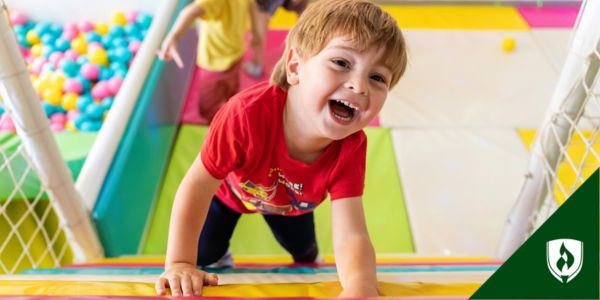
You love being with children. Whether it’s your own, your friends’ kids or those you encounter in the checkout line at the grocery store, you’ve always had a knack for interacting with little ones. This has led you to consider creating a career out of this passion. But you’re not sure whether going back to school is worth the time, effort and resources.
Teaching preschool requires a combination of education, experience and certain intangible qualities. While education and experience will come with time and hard work, you may already have some of the necessary traits it takes to become a great preschool teacher.
With the help of some early childhood education (ECE) experts, we highlighted nine characteristics the best preschool teachers share. Familiarizing yourself with these will give you a better idea whether you are a natural fit for the field. Keep reading to find out whether you’re cut out for a career in a preschool classroom.
You should consider becoming a preschool teacher if ...
1. You think children are fascinating
The number one characteristic in a great preschool teacher is someone who is fascinated by children and finds joy in being around them, according to Daniel Koffler, founder of Explore + Discover Early Learning Center. If you’ve spent any time around children, you know how simultaneously hilarious and insightful they can be as they work to understand the world around them.
Are you interested in what little kids say? Do you enjoy their wild imaginations? Are you curious about the learning behind their chatter? Do they make you laugh? Koffler says a great ECE teacher “watches and listens and knows what learning looks like.”
2. You have lots of patience
This doesn’t necessarily mean you smile serenely when people cut you off in traffic. Think specifically of your patience level with children or other beings you don’t expect to move at your pace.
Salpy Baharian, M.Ed. and founder of Teacher.org, says great levels of patience are necessary to work with young children who grow and develop at different rates. You might have one student operating with the independence and curiosity of Dora the Explorer, and other students struggling just to be in your classroom without mom or dad.
It is vital that you treat each of your little ones with patience and work at their level.
3. You are optimistic
Are you a glass-half-full kind of person? Do friends and coworkers comment on your positive, even perky attitude? That trait is extremely valuable in ECE.
“Teachers must possess an optimistic outlook,” Baharian says. “Their interactions will play an integral part in helping young children develop confidence and positive self-image.”
Negativity is detrimental and downright destructive in an ECE classroom. Your students will be watching you, picking up on your body language. If you approach each day with optimism and excitement, you will impact their learning (and their lives) for the better.
4. You know when (and why) to step in
If students are misbehaving and order is spiraling out of control, avoiding confrontation isn’t the smartest option. Great ECE instructors care about their students and discipline as an extension of that care.
“At times when I’ve had to ‘discipline’ a child, I remind them that if I didn’t love them and care about their growth, I would let their misbehavior continue,” says Karen Thigpen, preschool teacher at New Life Academy.
Thigpen’s approach to discipline is to remind students that their teachers are there to help them grow in academic ability as well as personal development. “Since I love them, I have a responsibility to help them learn to make good choices in their behavior.”
5. You aren’t afraid to get creative
“One must possess great levels of creativity,” Baharian emphasizes, in order to meet individual needs in the classroom. While they could all be classified as “small humans,” each of your students is an individual. The more creativity an ECE teacher brings to the table, the easier it will be to engage them as needed.
This includes the artistic creativity you might employ making crafts, music or recipes. But it also includes the creativity to problem solve and brainstorm new approaches. Do you thrive with unexpected challenges? Are you able to explain things in more than one way?
6. You don’t know the meaning of “too enthusiastic”
Are you balancing work, family and friends, in addition to thinking about going back to school? Are you the one people call for help—not because you aren’t busy, but because you meet tasks with enthusiasm?
Preschool teachers maintain a positive learning environment by being enthusiastic about kids, about learning and about teaching. Children can tell when you don’t want to be there. ECE teachers need to be ready every day to meet students with energy and enthusiasm. That doesn't mean introverted teachers are out of luck, however—they just need to be able to be "on" when needed.
7. You support parents
If you are a parent yourself, you might understand the level of trust it takes to let others have your child in their care. A great ECE teacher, says Koffler, supports and listens to parents. That means listening to input and informing parents of changes or problems.
Strong preschool teachers understand that parents and teachers are allies. They meet any conflicts or confusions with rock-solid communication.
When you see disagreements at work or home, are you the mediator? Do you try to understand both sides of the story before making up your mind? Do you feel sympathy for frazzled parents in the grocery store? You might be well equipped to be a supportive teacher.
8. You are extra encouraging
Do you understand the strength of a supportive word right when it is needed most—like urging a friend to go after a promotion or leaving a supportive note for a coworker? Teaching preschool requires those same encouraging traits. Children thrive when they have a compassionate hand guiding them in the right direction.
“It is important for teachers to make learning a fun experience and spark curiosity in each child,” says Andrea Larson, preschool teacher for New Life Academy. Your encouragement might impact their whole academic career. Larson says children’s natural curiosity develops into excitement for school under an encouraging teacher.
9. You have some serious determination
Once you’ve made up your mind to do something, do you see it through? Do you weather the bad days well enough to move on to better ones?
Anyone who works with children for a living knows that good and bad days are part of the job. When the students hit a rambunctious streak, when you have a sour interaction with a parent, when you’re exhausted … you’ll need some determination to fall back on.
“Being a teacher, parent, or caregiver is one of the hardest jobs you can have. But it’s important work,” writes Leslie McCollom, ECE teacher and writer for Early Childhood Teacher. “If you have chosen to do this job—thank you. The world needs people like you in order to keep going.”
Are you destined to teach preschool?
If you found yourself nodding along while reading because you felt as if you were reading about yourself, that’s a great sign! You may be naturally inclined for teaching preschool. If only some of the traits resonated, don’t worry. Becoming a great preschool teacher is a process. Think of these qualities as the first step on the road toward formal education.
If you are still unsure, seek out opportunities to talk to current teachers about how they felt when they were just starting out. Try talking with a variety of teachers—recently graduated teachers can tell you about their schooling and job placement, while experienced teachers can tell you about the rewards and challenges of a long-term teaching career.
Get a behind-the-scenes look at the job itself in our article “9 Very Real Tasks You Might Not See in a Preschool Teacher Job Description.”
Additional Articles:
- What Can You Do With an Early Childhood Education Certificate? Exploring Your Options
- 6 Signs You Have What It Takes to Become a Childcare Provider
- Anti-Bullying Lesson Plans: 6 Ideas for Early Childhood Educators
- What is a Child Life Specialist? Helping Kids Cope with Medical Crisis
*Graduates of Early Childhood Education programs at Rasmussen College are not eligible for licensure as a teacher in an elementary or secondary school. A Bachelor’s degree and a state teaching license are typically required to work as a teacher in public and private school settings.
EDITOR’S NOTE: This article was originally published in 2016. It has since been updated to include information relevant to 2019. Expert insight remains from original article.




